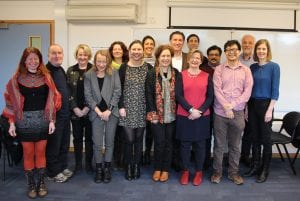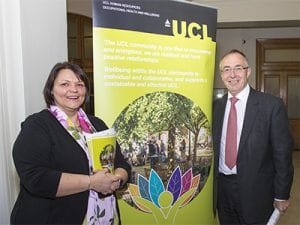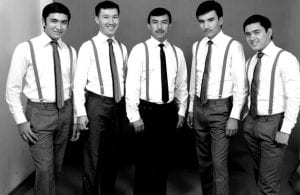
By Paola Garcia-Trevijano, UCL Biomedical Sciences
Metabolism’s impact on society is such that the two are in constant interaction. With this in mind, the Symposium on Food, Culture and Metabolic Health by Metabolism and Society on 16 February brought together a group of academics from several departments in UCL and the Francis Crick Institute.
Complex problems like metabolic disease require interdisciplinary solutions, and fostering such interactions was the goal of this innovative symposium.
Professor Frances Brodsky, Director of the Division of Biosciences, opened the symposium together with Professor Geraint Rees, Dean of the Faculty of Life Sciences.
In addition to three keynote lectures, the day featured short talks followed by a panel focused on fostering potential interdisciplinary collaborations.
The symposium ended on a lighter note with Chris Shipton, a live illustrator, presenting the sketches he put together throughout the day.
At the close of the symposium, Professor David Price, Vice-Provost (Research), announced the creation of a new interdisciplinary Research Domain focused on food and metabolism.
Putting the balance back in diet: the nutritional geometry of metabolic disease
Professor Steve Simpson, academic director of the Charles Perkins Centre of the University of Sydney, showed that the tendency to stick to a constant protein intake contributes to over consumption in fats and carbohydrates, due to the introduction of ultra-processed foods.
A few solutions include intermittent fasting, protein appetite dampening drugs, and surprisingly, a diet low in protein and high in carbohydrates which, despite the associated weight gain, was shown to lead to the healthiest individuals.
Session 1 – Present: where are we now?
In the first session, Dr Paul Chadwick spoke on the importance of developing an efficient way of communicating with different populations affected by metabolic problems. He introduced the behaviour change wheel, which aims to provide a common approach.
Dr Joanne Santini, who presented her work on the effect of arsenic contaminated water on health and the human microbiome, identified the importance of behavioural counselling in preventing and dealing with arsenic poisoning as well as insulin resistance.
Professor Nishi Chaturvedi’s work has shown that different population characteristics suggest different causes behind insulin resistance, highlighting the importance of clinical treatment tailored to different populations. In addition, linking research in insulin resistance and mitochondrial pathways to tumour research was deemed to be promising, with key connections between the work of Professor Michael Duchen and Dr Mariia Yuneva.
The taste of spoons and other inedible objects
Mark Miodownik, Director of the UCL Institute of Making, gave a keynote presentation on the way different materials influence the experience of eating: gold and chrome taste the most neutral, zinc the sweetest. All these features could be used to not only enhance our enjoyment of food but perhaps reduce the amoun t of savoury, yet detrimental ingredients (e.g. sugar) that we over-indulge in.
t of savoury, yet detrimental ingredients (e.g. sugar) that we over-indulge in.
Past: how did we get here?
This session focused on the past to look for guidance on how to shape the future to our benefit.
Evolution in terms of the metabolic network (Dr Markus Rasler) as well as in terms of our adaptation to diet throughout time (Professor Mark Thomas) were considered.
We can also learn from a shorter time frame by following obesity across generations (Professor Rebecca Hardy).
Professor Sue Hamilton discussed the idea of comparing our microbiome to that of the Easter Island population, which thrived with remarkable health and energy on very simple and restricted diets. Dr Filipe Cabreiro presented his work on the gut microbiome, which the panel felt was an important part of metabolic health, and discussed ways this could be examined from ancient remains to modern humans.
(more…)

 Close
Close



 t of savoury, yet detrimental ingredients (e.g. sugar) that we over-indulge in.
t of savoury, yet detrimental ingredients (e.g. sugar) that we over-indulge in.
